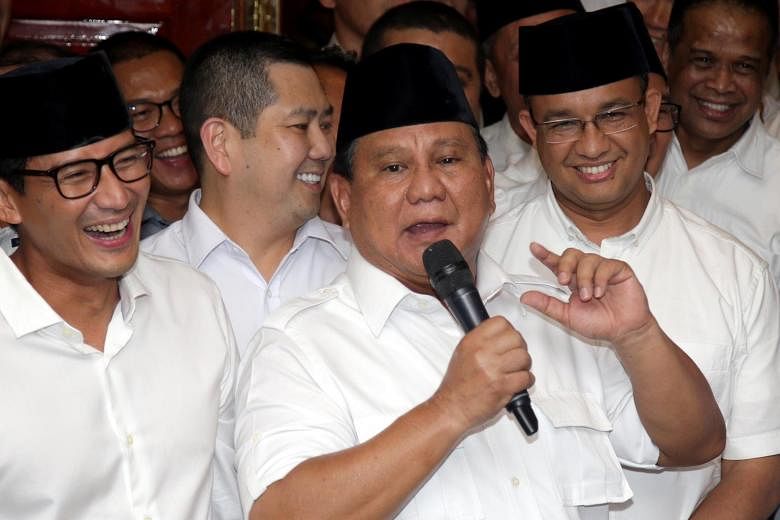The dust has yet to settle on Wednesday's election in Jakarta, but the political narrative has already gone national, shifting to Indonesia's presidential race even though it is not due until 2019.
President Joko Widodo has so far remained silent about the defeat of Mr Basuki Tjahaja Purnama, but the loss to opposition-backed Anies Baswedan has inevitably raised questions on his own prospects for re-election.
Mr Basuki, better known by his Chinese nickname Ahok, is a close ally of Mr Joko. He had served as deputy governor and inherited the top job at City Hall after Mr Joko was elected president three years ago.
Mr Anies was a spokesman for Mr Joko during his election campaign and later appointed culture and education minister, but he was unceremoniously sacked in July last year. Two months later, Mr Anies announced that he was running against Mr Basuki on a ticket backed by Mr Joko's old rival, Mr Prabowo Subianto. It is no secret that the former general is still itching for another run at the election he narrowly lost to Mr Joko in the 2014 race.
"If I have the people's support, and if my health allows it, I will run again," the opposition Gerindra Party chief said recently.

That signal of intent, which came just days before the first round of voting in February, all but confirmed the belief that the gubernatorial election was really a proxy contest for the presidential race between Mr Joko and Mr Prabowo.
All signs point to Mr Prabowo consolidating not just the financial backing but also the support of the political and religious elites that he needs to challenge Mr Joko.
On the night of Mr Anies' assumed victory, Mr Prabowo, in an open courtship of Muslim conservatives, acknowledged hardline cleric Rizieq Shihab for, of all things, "saving Indonesia's democracy".
As leader of the Islamic Defenders' Front, Mr Rizieq had mobilised thousands of Muslims to march against Mr Basuki, who is Chinese and Christian, and facing charges for insulting Islam.
Mr Rizieq's ability to call up a mob almost on demand will not be lost on Mr Prabowo as he prepares for a second bid for the Istana.
Playing the religion card to win elections in Indonesia, particularly outside Jakarta, has become more common and acceptable, said some observers. Even the son of former president Susilo Bambang Yudhoyono, Mr Agus Harimurti, courted the Muslim vote before he failed to make the final run-off for Jakarta governor in February.
Dr Yudhoyono's Democratic Party is also expected to feature at the next presidential election, either by fielding a candidate or playing the role of kingmaker. The rising influence of Islam in Indonesian politics will pose serious problems for Mr Joko, a Muslim who once had to fend off rumours that his mother was Christian.
Experts suggest that he will need to strengthen his ties with moderate Muslim groups such as Muhammadiyah and Nahdlatul Ulama, and tighten his alliances with Islamic political parties.
"Losing Jakarta as a result of these tactics has sent a chilling message to Jokowi and his Indonesian Democratic Party of Struggle (PDI-P), long perceived as the personification of the political vehicle for non-Muslim and secular voters," wrote Mr Rendi Witular, a senior editor at The Jakarta Post, yesterday.
"Jokowi is exposed to greater risk in his attempts to get re-elected, unless he succeeds in neutralising the proliferating sectarian playbook."
Jokowi is a popular moniker often used to refer to Mr Joko.
Some analysts believe Mr Anies' victory at the polls may fracture Mr Joko's ruling coalition led by the PDI-P, and open the door for other centres of power to emerge, or lead to a resurgence of the old political elite in Jakarta.
It will also not be lost on his coalition members and rivals that despite a high approval rating, the President was unable to influence the result of the Jakarta election.
On the other hand, Mr Prabowo will undoubtedly claim Mr Anies' win as the people's endorsement for his own candidacy in 2019.
Mr Emirza Adi Syailendra, a researcher from the S. Rajaratnam School of International Studies, said: "The opposition led by Gerindra will likely start to raise issues to undermine the cohesion of Jokowi's coalition, as Prabowo lays the groundwork for his presidential election.
"Jokowi has to drive a hard bargain to keep his coalition members from gravitating towards either Prabowo's or Yudhoyono's camp."


